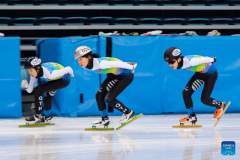Home>>
Q&A: Post-Games legacy boosts sustainable development of China's winter sports(Xinhua) 09:54, January 20, 2022
BEIJING, Jan. 19 (Xinhua) -- A post-Games legacy needs to be fully harnessed to promote sustainable development of China's winter sports in its endeavor to build a sporting powerhouse and a healthy country, a spokesperson from China's General Administration of Sport told Xinhua in an exclusive interview.
A survey released last week by China's National Bureau of Statistics shows that over 346 million Chinese people have participated in winter sports activities since the country won the bid to host the 2022 Winter Games, meaning that China's vision of "engaging 300 million people in winter sports" has become a reality.
The following is the interview with the spokesperson.
Q1: What progress has China made in cultivating winter sports talents over the past few years? How can we give full play to their talent in making contributions to the sustainable development of winter sports?
Spokesperson: Nearly one-third of the events had not been practised in China when we launched the bid for the 2022 Winter Olympics. There was also a shortage of athletes, coaches, referees and competition organizations. To achieve the goal of "full participation (in all 109 events)" at Beijing 2022, we started to conduct an extensive talent scout from 2017, recruiting athletes from summer sports like track and field, martial arts and gymnastics. High-level coaches have been hired from overseas. A large pool of more than 4,000 people was set up for the 2022 Winter Olympics and gradually streamlined to around 500. A solid foundation for "full participation" at the Beijing Winter Olympics has been laid.
Chinese athletes are making their final push with the aim of achieving excellence at the Games. Apart from setting up high-level winter sports teams, the General Administration of Sport has also focused on expanding the talent pool of referees and technical specialists. More than 2,000 domestic technical officials and a large number of experts in refrigeration, ice-making and snow grooming have been fostered through training courses, competition internship, and work rotation.
China will create a platform to give the expertise and wisdom of winter sports professionals full play after the Beijing Winter Olympics.
First, reforms will be made in the hosting of major sporting events. The 14th National Winter Games, which has been rescheduled for 2023 in Inner Mongolia, will fully benchmark the 2026 Winter Olympics in the program, venue and facilities, equipment, and rules to discover and select the core team for the 2026 Winter Olympics. The National Games to be held in Guangdong, Hong Kong and Macao in 2025 will feature new sports such as roller skating, grass skiing, aerials pool competitions, short track speed skating and figure skating to further promote winter sports in south China.
Secondly, we are looking to actively develop new competitions. Based on the National Championships and other domestic competitions, we will create a brand-new "General Cup" competition for winter sports. We hope to address unbalanced development between different sports and continue to improve our comprehensive strength in winter sports by setting middle- and long-distance team relay competitions and optimizing competition rules.
Thirdly, we will adhere to the "athlete-centered" philosophy and provide support for athletes' career development following their retirement. They are allowed to apply for jobs as coaches, referees, physical education teachers and social instructors once they go through training and assessment of capability. Outstanding retired athletes will be recommended to participate in events of international sports organizations and become integrated into the international winter sports family.
Q2: "Engaging 300 million people in winter sports" is a solemn commitment made by China at the beginning of its bid to the Winter Olympics. What measures has China taken to promote winter sports? How can we maintain the popularity of winter sports in the future?
Spokesperson: Engaging more people in winter sports is an essential task of the Olympic movement. We have taken the Beijing Winter Olympics as a good opportunity to vigorously expand winter sports across China. We provided funds for the construction of public skating venues. Public events such as "National Public Ice and Snow Season", "National Public Ice and Snow Week" and "National Ice and Snow Class" have been held throughout the year.
News and publicity also plays a big part in winter sports promotion. Through television, radio, online and other media, the culture of winter sports has been widely promoted, and with creative cultural products of winter sports, more and more people are aware of the brand of China's winter sports, and public enthusiasm in participating in winter sports has been growing. Over 346 million Chinese people have participated in winter sports up to October 2021, making the goal of "engaging 300 million people in winter sports" a reality. As the Declaration of the 10th Olympic Summit stated, "With 300 million Chinese people engaging with sports on snow and ice, global participation in winter sports will be taken to new levels."









